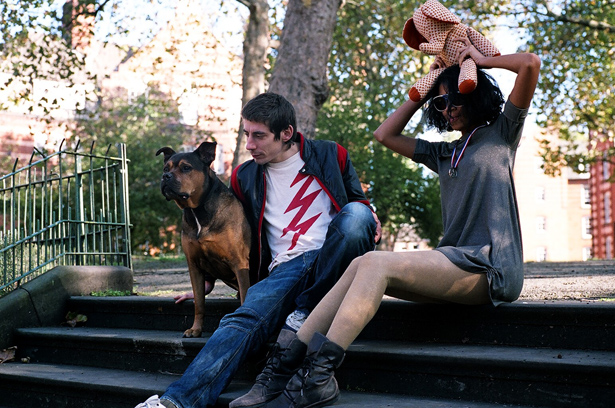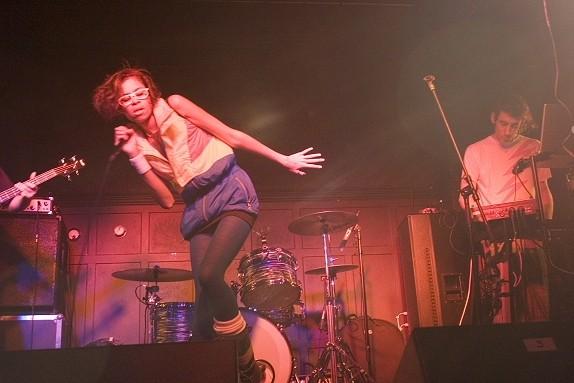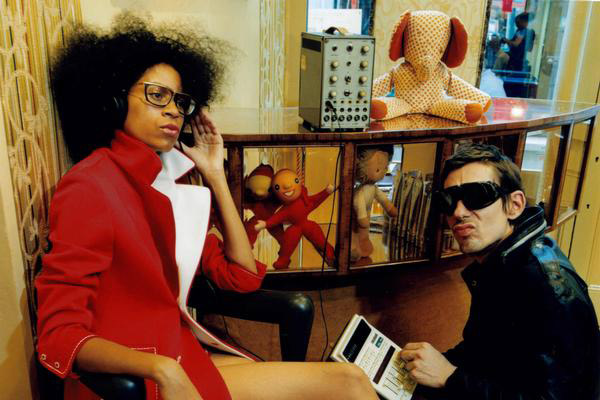The sinister, unsettling and paradoxical; such themes can produce some of the most interesting and pleasingly perplexing music. Music that requires your concentration yet is all the more satisfying for it. Sounding like a child with ADHD riding the surge and crash of a sugar overdose, My Toys Like Me produce a kind of naive anarchy, channelled through Tomy toy instruments and marry it with lyrics that hint at stalkers and poisonous relationships, managing to be disturbing without specifics.
Singer Frances Noon coolly produces vocals that are poised and commanding yet echoed in playgrounds throughout the land. The E number saturated blips, twitches and trip-hop beats are courtesy of the rave-schooled Lazlo Legezer. Menacing dub, samples that scream and wail, beats that hop, skip and skitter are joined with saccharine sweet melodies under the production of Legezer, a man happy to stay out of the spotlight at gigs but whose presence is at the forefront musically.
With one album behind them, the fantastic Where We Are, and attentions turned to new material, The Quietus caught up with Legezer to talk about being arrested for raving, production obsessing and why it took him six years to find a singer he was happy with.
Your album contains quite a vast array of styles, who or what influences you?
Lazlo Legezer: I grew up with my mum sort of having quite a vast array of music around and I think My Life In The Bush Of Ghosts, which was an album by David Byrne and Brian Eno, was a real revelation because it was made up of things that weren’t intentionally meant to be put together to make music. It was pretty much samplers really, but things were recorded on tape like an exorcism or some tribal chant thing. Things from all over the place were put together with instruments and the end result was music and I think that was a huge influence cause it made me realise you could do that and that was something I could do, because I’m not really an instrumentalist. The biggest influence of all was I was involved in a sort of warehouse rave thing in the early nineties, when it was really very bloody exciting because it was kind of the first time things like that had happened. We used to basically break into warehouses and have thousands of people come to party at the weekend. It was really like an early nineties rave. DJs were playing all kinds of music – it wasn’t like you had a house DJ or an electro DJ or a techno DJ – one DJ would just play a much wider array of music. People didn’t even know what they were doing in the same way as they seem to now so that was the biggest influence, that’s what made me go out and buy a sampler and start messing around and trying to make music myself.
It sounds like it would be the experimental and just having a go element that interests you. Is that correct?
LL: Yeah, the rave thing was a real D.I.Y culture anyway. I never ever imagined myself being a musician and I think just as soon as I was involved in this thing where people were doing stuff with music it definitely inspired me to just have a go and what I do is really is just mess about. I’m learning stuff all the time but I’m trying not to get stuck into habits and repeat myself so I almost kind of try and reinvent the wheel all the time, start from scratch and just mess about and just do what I’m doing. Obviously then it does need to really take shape and I have to have that kind of producer’s obsession with the details but that is just part of my personality.
What is the process like when you’re creating tracks with My Toys Like Me?
LL: It really does vary a lot. As we were working on the first album we were very consciously aware of trying to create an album that was actually good, not just a collection of tracks. Some albums sound like people are trying to make a single with every track, the filler being the ones that didn’t work out very well. We were definitely consciously aware of trying to make something that ebbed and flowed and had some sort of sense to it throughout the whole thing. What’s changed now is mainly that from playing live we are working on more upbeat material because we tried playing the mellow stuff and it didn’t cut through most of the time in London and in noisy venues. So we feel like we’ve got to wait until we’re balanced enough or our audience is mainly made up of people who have strictly come to see us, which is not the case a lot of the time with our gigs.
Playing live has had a real major impact and some of our songs are actually written in rehearsals now so it’s gone from being sort of mad times and bedlam to actually being more like proper work. We’ve got one song that we play in gigs that’s like that and it’s now quite a difficult challenge for me to now produce the recording because as I was saying before what I do is mess about and if something already exists its a lot harder cause there’s already an expectation of what it will be.
Now there’s no money in music what motivates you to be in a band?
LL: [Laughs] I actually got my first PRS royalty cheque yesterday and while it’s not going to make me a living it did make me very happy. What motivates me? It’s just what I do and I’m never going to stop doing it even if we don’t have electricity, compared to a traditional musician [I] definitely require electricity so I’d probably start building my own generator if that happens. Oh, I can’t imagine doing anything else really. It just completely obsesses me. I don’t have a great deal of structure in my life because I’m self-employed and really the structure in my life is in completing songs. That’s what obsesses me and gives me some sort of yardstick to measure how I’m progressing through my life. If I didn’t have that I’d just be kind of at sea somehow.

So would you say it was almost a compulsion to get it finished?
LL: Yeah, totally is a compulsion. People can talk to me and I can’t actually concentrate, when I’m really trying to finish a song. I’m sort of not there for the real world. I will have things going round in my head and maybe I’ll listen to you when you speak to me, maybe I’ll be somewhere else. Sometimes it’s a quick process and sometimes it takes a really long time. Sometimes it can feel like a fight and a struggle and that actually is the slightly mad thing because the defining ethos of what we’re trying to do is about being playful with our creativity. I think the reason so much music seems to lack life to me is motivation is either ego or money. I know you say there’s no money in it but a lot of the commercial music is just being made by the jobbing sort of song writers who will pitch at celebrities. To them it is just a job so I think having a sense of what our motivation is and being aware of that is what’s going to define the end result.
You mentioned spending ages trying to refine it, would you say you noticed the little things more?
LL: The end result is just the result of millions upon millions of tiny decisions and little subtle changes. It’d be like if a sculptor had a block of stone and he did his whole sculpture just by taking tiny little chips, even at the beginning and the end result is a feminine figure or something. So three quarters of the stone has actually been removed but it’s all been removed in tiny little chips and no big chunks have ever been hacked off.
You also mentioned the playfulness and the child like, what really intrigues me about your album is the mixture of the childlike and the slightly more disturbing and the adult lyrics, is this something that’s intentional or just developed?
LL: We are adults but we’re really silly with other people in our lives, we just are very childish people. The lyrical content comes from nowhere and you don’t really have total control over it. It’s something that does reflect who we are as people but there may also be a hint of us wanting to regress a bit in doing it. We’re not really making pop music, we really like pop music and we’re trying to make it but failing in a good way. The things that actually work in the context of what we’re doing often are childish. One way I think I get it across is if you’re making a dance record you can’t really talk about anything serious, it’s got to be about having fun, or sex or attraction. There may be other things, we could go through all the dance music out there with lyrics, but you find yourself limited on what works in that context. We might write a lyric that is really quite serious but we’ll have to ditch it because the music doesn’t want to get married with that lyric and we might have to write something that’s a bit more just about how you’re feeling at the time and that is kind of a bit more childish because when we’re young we spend more time thinking about how we are in that minute rather than thinking about the future or politics or injustices of the world or whatever.
I just wanted to go back to the raves for a second, you said that these influenced you and your music; which particular elements?
LL: It’s really hard to get across, but I started going to these raves when I was 17 so I really do feel that I sort of grew up in this environment. It wasn’t just ‘Oh we’re going out at the weekend’, it actually was basically like a little cultural revolution. It was our whole lives and it did grow to become a political campaign, even though it didn’t want to be. Our campaign against the Criminal Justice Act was our way to save what we were doing against the oppression of the authorities. It’s quite a hard thing to convey, if you’re going to a club or a party or a rave it’s just sort of going out at the weekend, but really it’s a group of people, lots and lots of people who see each other every week so it had that community aspect to it and we were all doing something that wasn’t about money. It was like a temporary autonomous zone, there was no law, but it established its own kind of culture which policed itself. It did go down the toilet, become a horrible, negative thing eventually but for a while it really totally defined my life and it’s actually still kind of defines my life.
I still feel like what we’re doing now in My Toys Like Me has totally grown out of that seed and there’s loads of other people that were involved in that scene and are doing interesting creative things as well. Even when it became a political campaign it was basically a giant party. We had trucks with sound systems on, on organised marches through central London. We almost thought that we were going to change the world in a way, like the hippies did in the 60s. It’s completely delusional in one sense but in another sense it did change a lot, how we look at the world and how we go about doing things. I really can’t imagine being the person I am, creating the things I create without having gone through that experience. I think I would be a much more normal person, it kind of mutated me a bit into being a bit of a weirdo.
Is it true that you were arrested during that time for either organising or participating?
LL: Yeah, more than once, but I once got held for 22 hours and I sued the police. It was before the Criminal Justice Act because they could have actually charged me under the CJA but they were misusing laws they already had to do the same thing before the law had been brought in so they charged me with conspiracy to commit a public nuisance and in order to prevent a breach of the peace, so I sued them and got three and a half thousand pounds in damages for wrongful arrest and false imprisonment, which I spent on music equipment. We did get a lot of harassment. our phones were tapped and I was lucky because I was kind of, of no fixed abode when I was arrested, but everybody else got their computers and office equipment and paperwork, basically everything, taken away and didn’t get it back for months and months so I kind of came off lightly. But basically there was full-on police harassment of everybody involved and the intelligence operation going on, you might think was paranoia, but was proved by information that they had when they interviewed us, showed that it was information from phone calls that we’d made and they could even pinpoint which phone call. In the end it transpired that the public phone boxes closest to our houses, they were able to get information from those.
Even when I’m saying it to you now I’m thinking that it sounds like nonsense but it actually certainly appeared to be true. When my friend was arrested they actually quoted at him part of a conversation he had with me from the phone box. They did eventually totally put the dampeners on it, which was their intention and that was why I moved to Prague. It was because of the police I got this money and I was already being harassed and so I just kind of escaped for three years.
What made you come back?
LL: Basically my studio was falling to bits. At that time I was living in the Czech Republic and I could make a good living, a really good life. My rent was £75 pounds a month and I could earn that from a DJ gig, but then studio equipment still costs what studio equipment costs and international travel still costs a lot. So basically I felt like I had almost become trapped in the economy there and really it was my studio falling to bits. But my wife and I really wanted to travel and see the world and I really wanted to build my studio up. Also I worked with a really brilliant singer out there and did an album but she was singing in Czech so that really limited the distribution, the sales. I would have loved to work with the same singer again but I really wanted to work with a singer in English and so I came back to England to make my fortune I guess. It took 6 years to find that vocalist.
Wow, a lot of looking then.
LL: A lot of looking and a lot of people I tried to work with were actually some of my worst memories. There has to be a large element of trust involved in working together and if that trust is not there and they’re not prepared to just lay themselves out, they’re holding back and they’re not really telling you what their agenda is, then it’s an incredibly frustrating process. I went through a lot of that, then when I met Frances it was just completely fresh.

Do you go to any of these rave gigs that are on now?
LL: I’m usually working. I don’t really pay to go out and go to a rave, the paid events are never the same because they’re so much more controlled and it’s just a different thing. There are still free squat warehouse raves that go on but they’re dire places full of people that take ketamine every day of their lives. The last one of those that I went to was because I was going to work on a Sunday morning and I could hear the boom of the bass drum somewhere in the industrial estate that I was in. I just went to have a look and it was absolutely dire. All kinds of club and event type things can be brilliant and I think it’s down to the same thing. I think the promoters and the people who put it on, their vibe is everything. We played a few years ago at a night called Nag Nag Nag. It was a long running club night and it was just absolutely fantastic. Somehow they had managed to attract a crowd that was everyone from people who really dress up in all kinds of different ways, whether that be weird sort of gothy with twisty things in their hair and giant boots, to the really trendy, really fashionable, every kind of well dressed person, people in suits after work and then all kinds of really normal scruffy people as well. You could literally pick out every different kind of clubber. As soon as I saw that I was so relaxed about playing there because I knew these people were going to enjoy what we do, because they’re not trying to be a particular thing, these people are all united by a love of something and it’s not the fashion. That’s actually the closest thing I’ve been to, to the actual vibe.


